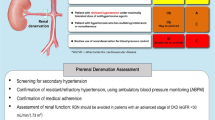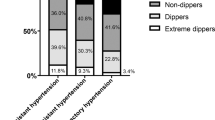Abstract
Catheter-based renal denervation (RD) has been introduced recently as a potentially effective invasive treatment of refractory hypertension. The proportion of patients with severe hypertension suitable for RD is not clear. The aim of this study was to identify what percentage of patients has truly resistant essential hypertension and are thus potentially eligible for RD. We investigated 205 consecutive patients referred to a university hypertension center for severe hypertension within 12 months. Ambulatory 24-h blood pressure (BP) monitoring (24 h ABPM), secondary hypertension screening and compliance to treatment testing (by use of plasma drug level measurements) were performed in all patients. Fifty-seven patients (27.8%) did not have truly resistant hypertension (RH) based on clinical BP. Among the remaining 122 patients (59.5%) with RH confirmed by 24 h ABPM, 50 patients (24.4% of the original cohort) had a secondary cause of hypertension and in 27 (13.2%) non-compliance to treatment was confirmed. Thus, only 45 patients (22%) had truly resistant essential hypertension and were considered for RD. Only one-third (n=15, 7.3% of the original cohort) was, however, finally referred for RD (14 were excluded due to contraindications for RD and 16 refused the invasive treatment). In conclusion, thorough examination of severe hypertension including 24 h ABPM, secondary hypertension exclusion and drug compliance testing before considering RD reveals that majority of these patients are not suitable for RD. Specifically, compliance to treatment testing should be mandatory in order to identify eligible candidates for RD.
This is a preview of subscription content, access via your institution
Access options
Subscribe to this journal
Receive 12 digital issues and online access to articles
$119.00 per year
only $9.92 per issue
Buy this article
- Purchase on Springer Link
- Instant access to full article PDF
Prices may be subject to local taxes which are calculated during checkout

Similar content being viewed by others
References
Lewington S, Clarke R, Qizilbash N, Peto R, Collins R . Age-specific relevance of usual blood pressure to vascular mortality: a meta-analysis of individual data for one million adults in 61 prospective studies. Lancet 2002; 360 (9349): 1903–1913.
MacMahon S, Peto R, Cutler J, Collins R, Sorlie P, Neaton J et al. Blood pressure, stroke, and coronary heart disease. Part 1, prolonged differences in blood pressure: prospective observational studies corrected for the regression dilution bias. Lancet 1990; 335 (8692): 765–774.
Mancia G, Fagard R, Narkiewicz K, Redon J, Zanchetti A, Bohm M et al. 2013 ESH/ESC guidelines for the management of arterial hypertension: the Task Force for the Management of Arterial Hypertension of the European Society of Hypertension (ESH) and of the European Society of Cardiology (ESC). Eur Heart J 2013; 34 (28): 2159–2219.
Carey RM . Resistant hypertension. Hypertension 2013; 61 (4): 746–750.
Savard S, Frank M, Bobrie G, Plouin PF, Sapoval M, Azizi M . Eligibility for renal denervation in patients with resistant hypertension: when enthusiasm meets reality in real-life patients. J Am Coll Cardiol 2012; 60 (23): 2422–2424.
Verloop WL, Vink EE, Voskuil M, Vonken EJ, Rookmaaker MB, Bots ML et al. Eligibility for percutaneous renal denervation: the importance of a systematic screening. J Hypertens 2013; 31 (8): 1662–1668.
Fadl Elmula FE, Hoffmann P, Fossum E, Brekke M, Gjonnaess E, Hjornholm U et al. Renal sympathetic denervation in patients with treatment-resistant hypertension after witnessed intake of medication before qualifying ambulatory blood pressure. Hypertension 2013; 62 (3): 526–532.
Burnier M, Wuerzner G, Struijker-Boudier H, Urquhart J . Measuring, analyzing, and managing drug adherence in resistant hypertension. Hypertension 2013; 62 (2): 218–225.
Ceral J, Habrdova V, Vorisek V, Bima M, Pelouch R, Solar M . Difficult-to-control arterial hypertension or uncooperative patients? The assessment of serum antihypertensive drug levels to differentiate non-responsiveness from non-adherence to recommended therapy. Hypertens Res 2011; 34 (1): 87–90.
Jung O, Gechter JL, Wunder C, Paulke A, Bartel C, Geiger H et al. Resistant hypertension? Assessment of adherence by toxicological urine analysis. J Hypertens 2013; 31 (4): 766–774.
Štrauch B, Petrák O, Zelinka T, Rosa J, Šomlóová Z, Indra T et al. Precise assessment of noncompliance with the antihypertensive therapy in patients with resistant hypertension using toxicological serum analysis. J Hypertens 2013; 31 (12): 2455–2461.
Charles_University, (Czech_Republic). Renal Denervation in Refractory Hypertension (PRAGUE-15). In: ClinicalTrials.gov [Internet]; Bethesda (MD): National Library of Medicine (US). 2000- [cited 2012 March 19]. Available from: http://clinicaltrials.gov/show/NCT01560312 NLM Identifier: NCT01560312, 2012.
Funder JW, Carey RM, Fardella C, Gomez-Sanchez CE, Mantero F, Stowasser M et al. Case detection, diagnosis, and treatment of patients with primary aldosteronism: an endocrine society clinical practice guideline. J Clin Endocrinol Metab 2008; 93 (9): 3266–3281.
Gonzalez O, Iriarte G, Rico E, Ferreiros N, Maguregui MI, Alonso RM et al. LC-MS/MS method for the determination of several drugs used in combined cardiovascular therapy in human plasma. J Chromatogr B Analyt Technol Biomed Life Sci 2010; 878 (28): 2685–2692.
Chytil L, Štrauch B, Cvačka J, Marešová V, Widimský J Jr, Holaj R et al. Determination of doxazosin and verapamil in human serum by fast LC-MS/MS: application to document non-compliance of patients. J Chromatogr B Analyt Technol Biomed Life Sci 2010; 878 (30): 3167–3173.
Esler MD, Krum H, Sobotka PA, Schlaich MP, Schmieder RE, Bohm M . Renal sympathetic denervation in patients with treatment-resistant hypertension (The Symplicity HTN-2 Trial): a randomised controlled trial. Lancet 2010; 376 (9756): 1903–1909.
Symplicity HTN-1 Investigators. Catheter-based renal sympathetic denervation for resistant hypertension: durability of blood pressure reduction out to 24 months. Hypertension 2011; 57 (5): 911–917.
Brinkmann J, Heusser K, Schmidt BM, Menne J, Klein G, Bauersachs J et al. Catheter-based renal nerve ablation and centrally generated sympathetic activity in difficult-to-control hypertensive patients: prospective case series. Hypertension 2012; 60 (6): 1485–1490.
Persu A, Azizi M, Burnier M, Staessen JA . Residual effect of renal denervation in patients with truly resistant hypertension. Hypertension 2013; 62 (3): 450–452.
Persu A, Jin Y, Azizi M, Baelen M, Völz S, Elvan A et al. Blood pressure changes after renal denervation at 10 European expert centers. J Hum Hypertens 2014; 28 (3): 150–156.
Mahfoud F, Luscher TF, Andersson B, Baumgartner I, Cifkova R, Dimario C et al. Expert consensus document from the European Society of Cardiology on catheter-based renal denervation. Eur Heart J 2013; 34 (28): 2149–2157.
Schmieder RE, Redon J, Grassi G, Kjeldsen SE, Mancia G, Narkiewicz K et al. ESH position paper: renal denervation—an interventional therapy of resistant hypertension. J Hypertens 2012; 30 (5): 837–841.
Witkowski A, Prejbisz A, Florczak E, Kadziela J, Sliwinski P, Bielen P et al. Effects of renal sympathetic denervation on blood pressure, sleep apnea course, and glycemic control in patients with resistant hypertension and sleep apnea. Hypertension 2011; 58 (4): 559–565.
Acknowledgements
This study was supported by research project of the Ministry of Education of Czech Republic NT14155-3/2013 and by Charles University research project UNCE No. 204010 and PRVOUK No. P35/LF1/5.
Author information
Authors and Affiliations
Corresponding author
Ethics declarations
Competing interests
The authors declare no conflict of interest.
Rights and permissions
About this article
Cite this article
Rosa, J., Zelinka, T., Petrák, O. et al. Importance of thorough investigation of resistant hypertension before renal denervation: should compliance to treatment be evaluated systematically?. J Hum Hypertens 28, 684–688 (2014). https://doi.org/10.1038/jhh.2014.3
Received:
Revised:
Accepted:
Published:
Issue Date:
DOI: https://doi.org/10.1038/jhh.2014.3
Keywords
This article is cited by
-
Simultaneous Determination of Metoprolol and Bisoprolol in Human Serum by HPLC-MS/MS for Clinical Drug Monitoring
Pharmaceutical Chemistry Journal (2018)
-
Combination antihypertensive therapy in clinical practice. The analysis of 1254 consecutive patients with uncontrolled hypertension
Journal of Human Hypertension (2016)
-
Screening for non-adherence to antihypertensive treatment as a part of the diagnostic pathway to renal denervation
Journal of Human Hypertension (2016)
-
Should All Patients with Resistant Hypertension Receive Spironolactone?
Current Hypertension Reports (2016)
-
Renal Denervation after Symplicity HTN-3: An Update
Current Hypertension Reports (2014)



